The beauty of God’s creation
Wednesday, April 22, is the 50th anniversary of Earth Day. This year also marks the fifth anniversary of Pope Francis’ encyclical letter, Laudato Si’ [“On Care for Our Common Home”].
In the April 17 edition of Dehonian Spirituality, Fr. Byron Haaland, SCJ, writes that “the beauty of God’s creation speaks volumes to those willing to perceive and observe. Some prefer the vast ocean to sense God’s presence; others, the majesty of lofty mountains. Still others, the wide-open vista of desert or prairie. But some prefer the miraculous events that play out in ordinary time. I believe it is precisely in the ordinariness of our routine, as mundane or miserable as it may get, that God’s presence is most profoundly experienced.”
Click here to read Fr. Byron’s story of one person’s profound experience of God found in an ordinary task. A prayer for Earth Day is also included in the issue.
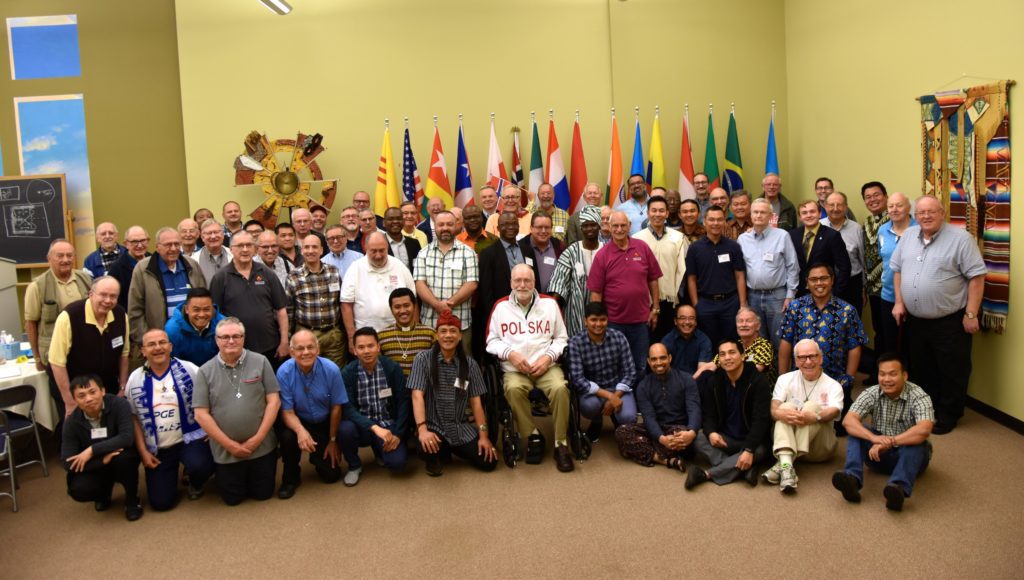
Changes and adaptations
Making plans during these months of the pandemic requires a commitment to flexibility. Every item in the calendar has an asterisk next to it that looks remarkably like a COVID-19 graphic.
A recent scheduling change concerns the June 8 Province Jubilee Celebration and the June 9-12 Province Assembly. Last week, Fr. Ed Kilianski, SCJ, and the Provincial Council decided to postpone the Jubilee Celebration and cancel the assembly. The council will discuss possible dates for rescheduling the Jubilee when they meet May 5-6. The meeting will be held by video conference. Also meeting by conference call is the Province Finance Commission, which will review budgets tomorrow (April 21) in preparation for the May council meeting.
“Safe at Home” extended
Wisconsin’s “Safe at Home” order has been extended by the governor until May 26, the day after Memorial Day.
“We here at SHSST had already anticipated finishing the semester by offering our classes online until Friday, 1 May, the last day of our regularly scheduled courses for MDiv and Lumen Cordis MA students,” wrote Fr. Raúl Gómez, SDS, SHSST president – rector, in an email to students and staff. “I am happy to report that the move to online delivery has been largely successful and the completion [of the semester] should be fairly smooth.”
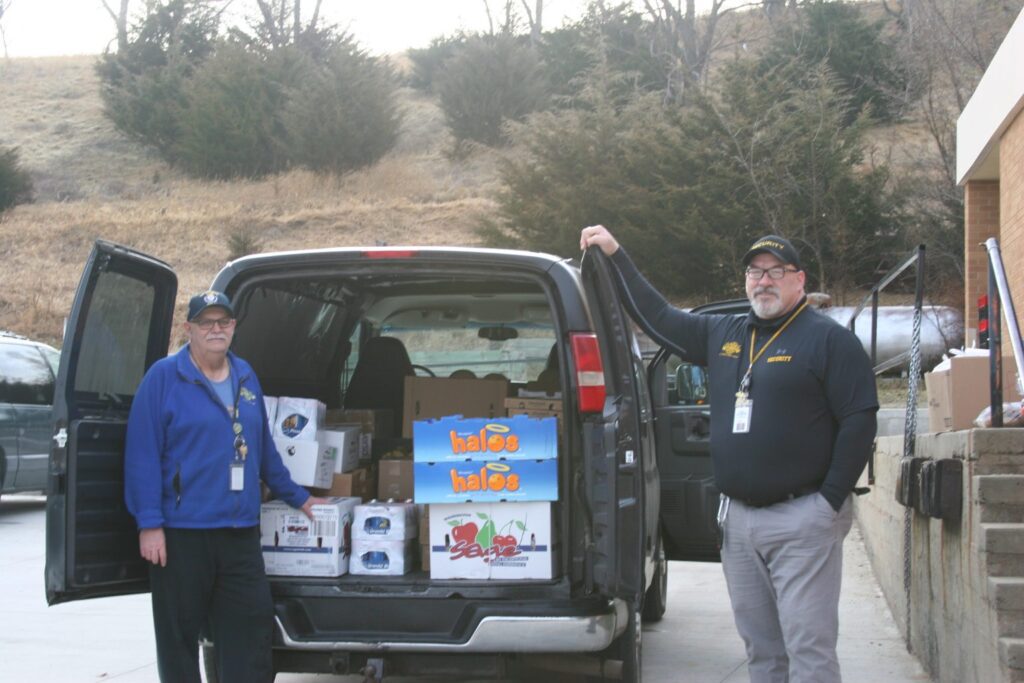
Adapting in South Dakota
With a wide variety of programs –– everything from education to health care to social work to development –– St. Joseph’s Indian School is racking up a long list of adaptations in its efforts to meet the needs of its students and their families, as well as the school’s many employees and benefactors. Health Center staff have made more than 95 family contacts to ensure uninterrupted prescriptions and supplies. When families are unable to procure needed medications due to shortages in their home communities, nurses work with St. Joseph’s local pharmacy to fill the gaps.
Native Hope is collaborating with tribal chairmen to learn of local needs. Since the COVID-19 outbreak, Native Hope has delivered 465 care packages that include baby items, cleaning supplies, food, clothing and hygiene essentials. The dining hall at St. Joseph’s is now a staging area for assembling food boxes for students’ families.
Staff at the Akta Lakota Museum are examining ways to develop virtual experiences for students and visitors. Lakota Language lessons for families and students are being recorded.
Staff from the Donor Care Center in Sioux Falls are working from home, answering donor calls (nearly 10,000 in the past month), responding to emails, voice mails and maintaining social media response. Mail processing for development continues. In March, 235,907 donations were processed for St. Joseph’s and 65,985 for the Priests of the Sacred Heart (St. Joseph’s processes benefactor mail for the Province Development Office).
And, of course, students are receiving assignments, and assistance with them, from their teachers and houseparents.
Please remember
+ Fr. Alessio Gobbin, a member of the North Italian Province, died today (April 20). He was born in 1936, professed in 1953 and ordained in 1963.
+ Fr. Karl Werner Hogeback, a member of the German Province, died on April 19. He was born in 1938, professed in 1961 and ordained in 1967.
+ Br. Pierre Rassarie, a member of the Franco-European Federation, died on April 17. He was born in 1938 and professed in 1958.
+ Fr. Fr. Aurelio Cimadom a member of the North Italian Province, died on April 14. He was born in 1929, professed in 1948 and ordained in 1957.
+ Fr. Johannes Walhorn, a member of the German Province, died on April 14. He was born in 1933, professed in 1957 and ordained in 1963.
+ Fr. Klaus Enea Janner, a member of the North Italian Province, died on April 13. He was born in 1935, professed in 1957 and ordained in 1965.
Update
As of yesterday, Fr. Martin Kadamattu Antony, SCJ, originally a member of the Indian District, is now a member of the Canadian Region. He will continue to live and serve in the Toronto community as a member of the parish team at St. Thomas More in Scarborough.
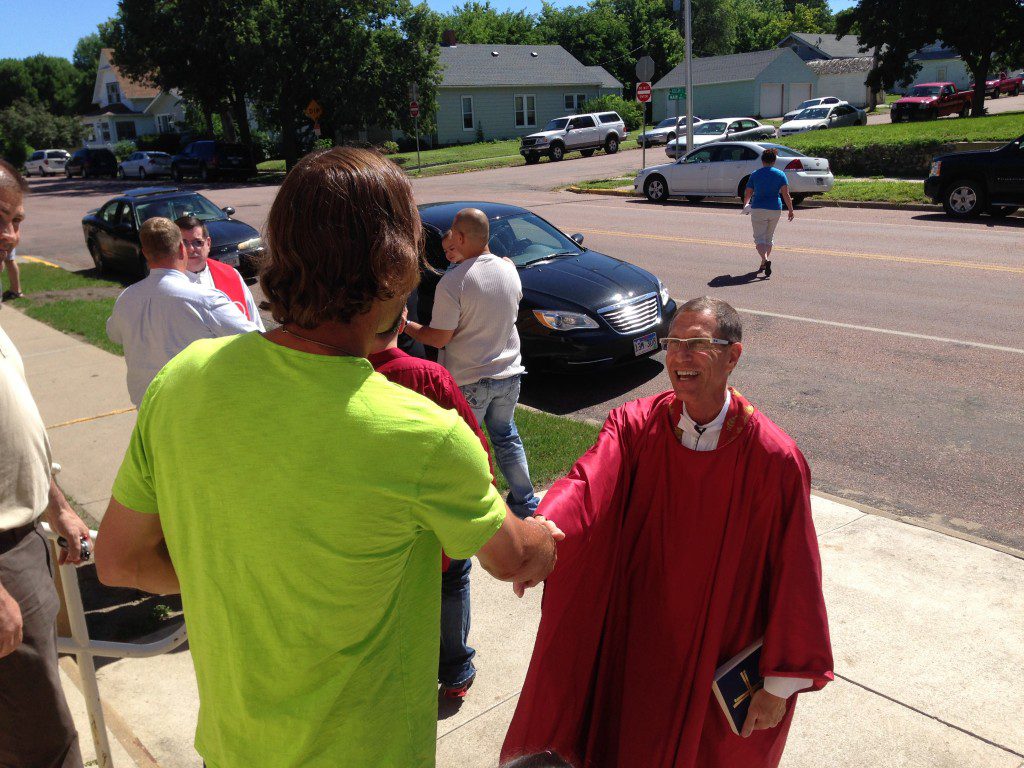
What the homeless teach
“She has intimacy with pain,” wrote Fr. Guy Blair, SCJ, about a person who has become a regular part of his life.
“I caught a glimpse of her, or rather I glimpsed someone wrapped in a blanket in an alleyway near the Dollar Store,” he wrote. “An old woman surrounded by the usual shopping cart filled with her belongings, sad. Back at my apartment, I considered her, perhaps 70 years old, homeless in the ‘greatest’ country in the world.
“It wasn’t an easy action for an introvert like me to do, but it began with the realization that this old woman might be someone’s mother; really, she was my sister. I made a meal and walked to the store. She was there and I offered her the meal.
“’Is there anything I can help you with?’ I asked. Surprisingly she responded, ‘I got everything I need here.’
“I got everything I need here. Really? My face reddened at the embarrassment of myself and my inflated needs.
“Despite whatever her issues are and what may have led an old woman into homelessness, she has not complained about social distancing, about deprivations because the stores are closed or that there are no beauty salons to get her hair done. She has not complained about feelings of disconnection. The COVID-19 virus, the disruption to social life and all the other situations that we find ourselves in, she has already experienced them and more. Her demeanor, her responses, are not based on complaints connected to the lack of comforts in her life. She has intimacy with pain, she seems to have accepted suffering as her companion.”
Click here to read Fr. Guy’s full reflection.

Continuing to reflect
We invite SCJs and coworkers to share their reflections on the impact of the coronavirus (COVID-19) on themselves personally and in their ministries. These have been posted on the US Province website, Facebook page and Instagram account. Click here to access the full list of reflections. Click here to share your own.
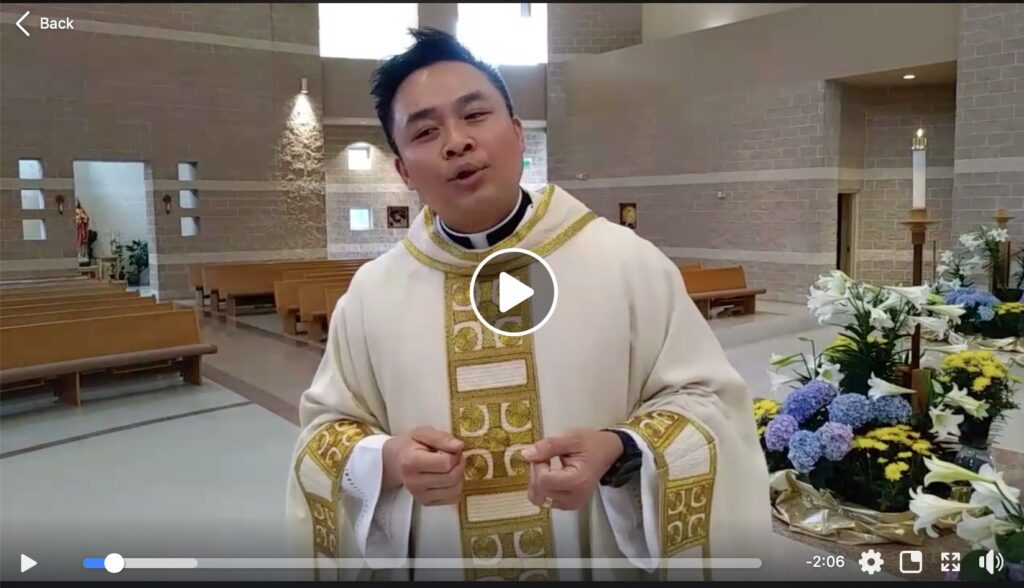
Online ministry
In most areas, the COVID-19 stay-in-place orders went into effect just as Christians were preparing for Easter Week. How to come together to celebrate when we can’t be together? For many faith communities, it meant a crash-course in online ministry.
Our Lady of Guadalupe in Houston was one of the first of the province’s parishes to offer online Masses. Liturgies are available in both Spanish (10:30 a.m. on Sundays) and English (9:00 a.m. on Sundays). You can tune in via the parish Facebook page.
In northwest Mississippi, the Priests of the Sacred Heart minister as a pastoral team to six parishes. Just before Holy Week, the team put together a Facebook page to offer livestreaming of Masses, also in English and Spanish. Click here to access the schedule. Church bulletins and other information are also shared on the Facebook page.
As we noted previously, the pastoral team in South Dakota developed a website to livestream liturgies, starting with Palm Sunday. Click here to access the site.
Websites noted above:
Our Lady of Guadalupe, Houston
Northwest Mississippi parishes
Catholic Plains Ministries (South Dakota)
Closing photo
In these days of online education, Fr. Jim Schroeder, SCJ, is pictured below teaching a class via video conference to participants in the Intercommunity Novitiate program. Novices for a variety of religious communities in the Chicago – Milwaukee area regularly come together for presentations on issues common to all who are discerning religious life.
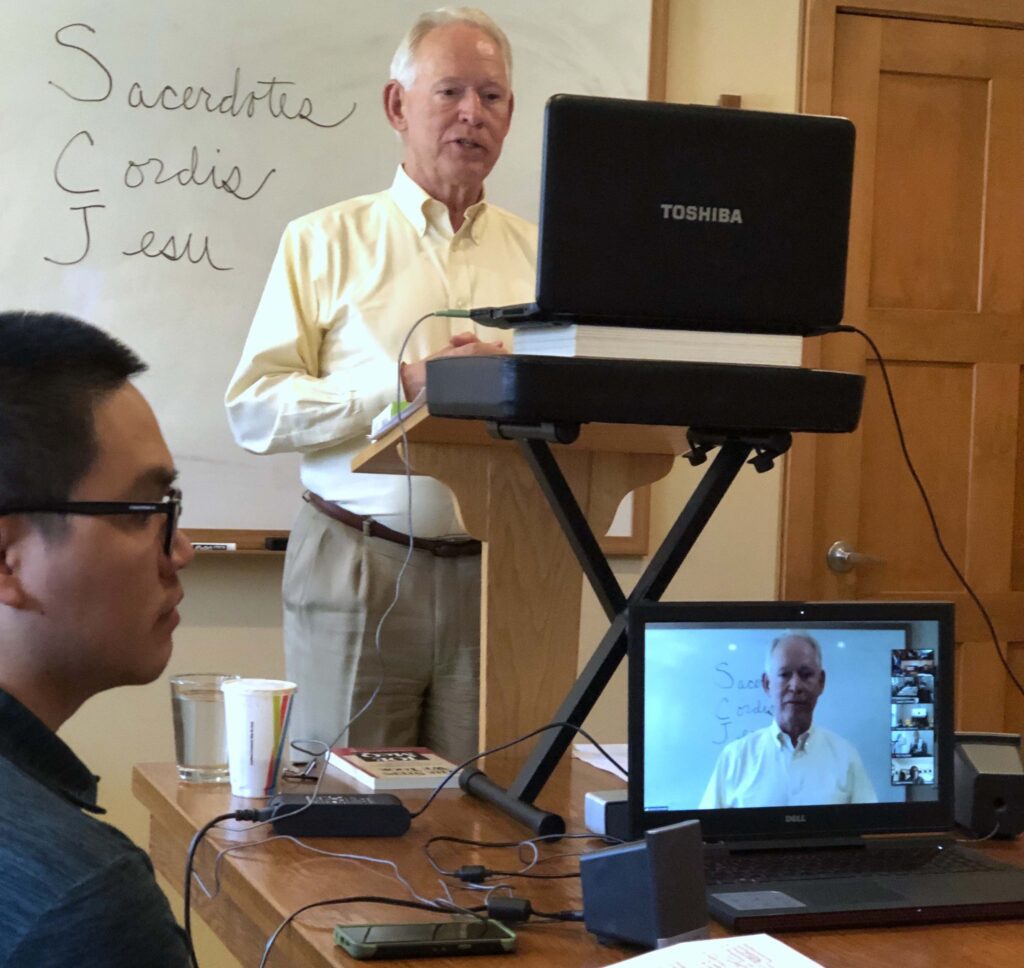
Click here to subscribe to the weekly news (Fridge Notes) via email
